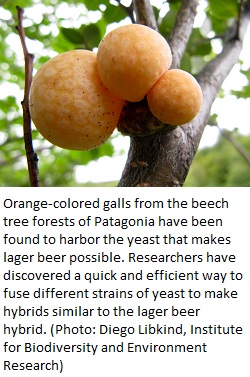 Researchers in Wisconsin, a state already known for its good use of yeast for the brewing of beer, are developing yeast hybrids that would also help in biofuels production. This article from the University of Wisconsin says the scientists at the school continue to find more strains suited for the green fuel making.
Researchers in Wisconsin, a state already known for its good use of yeast for the brewing of beer, are developing yeast hybrids that would also help in biofuels production. This article from the University of Wisconsin says the scientists at the school continue to find more strains suited for the green fuel making.
“We can achieve hybrids at rates of one in a thousand cells,” notes William Alexander, a University of Wisconsin-Madison postdoctoral research associate and the lead author of a paper describing the new method in a special synthetic biology issue of the journal Fungal Genetics and Biology. “It is much more efficient than nature.”
There are hundreds of known species of yeasts and they occupy almost every ecological niche imaginable worldwide. They are essential to the process of fermentation, where the microbes convert sugars to alcohol and carbon dioxide. Yeasts are used widely to not only make beer, wine and bread, but also cider, whiskey, cheese, yogurt, soy sauce and an array of other fermented foods and beverages. In industry, yeasts are used to produce biofuels and to make enzymes, flavors and pigments and even drugs such as human insulin.
An ability to quickly and efficiently churn out new yeast interspecies hybrids means industries that depend on yeasts will have many more organisms to experiment with to make new flavors, enhance production and produce entirely new products, explains Chris Todd Hittinger, a UW-Madison professor of genetics and the senior author of the new study…
The new yeast hybridization method uses plasmids, circles of DNA that can be built into an organism to confer a genetic quality. In the lab, plasmids are routinely used to manipulate genes in cells. Genes in the plasmids facilitate yeast hybridization by expressing a naturally occurring yeast protein that allows two distinct species of yeasts to mate.
“The advantages of the technique are speed, efficiency, and precision,” says Hittinger, a world authority on yeast genetics and a co-discoverer of the wild Patagonian yeast that formed the lager beer hybrid. “Within a week, you can generate a large number of hybrids of whatever two species you want, creating forms never seen before.”
Funding for the research comes from grants from the National Science Foundation and the Department of Energy through the Great Lakes Bioenergy Research Center.

